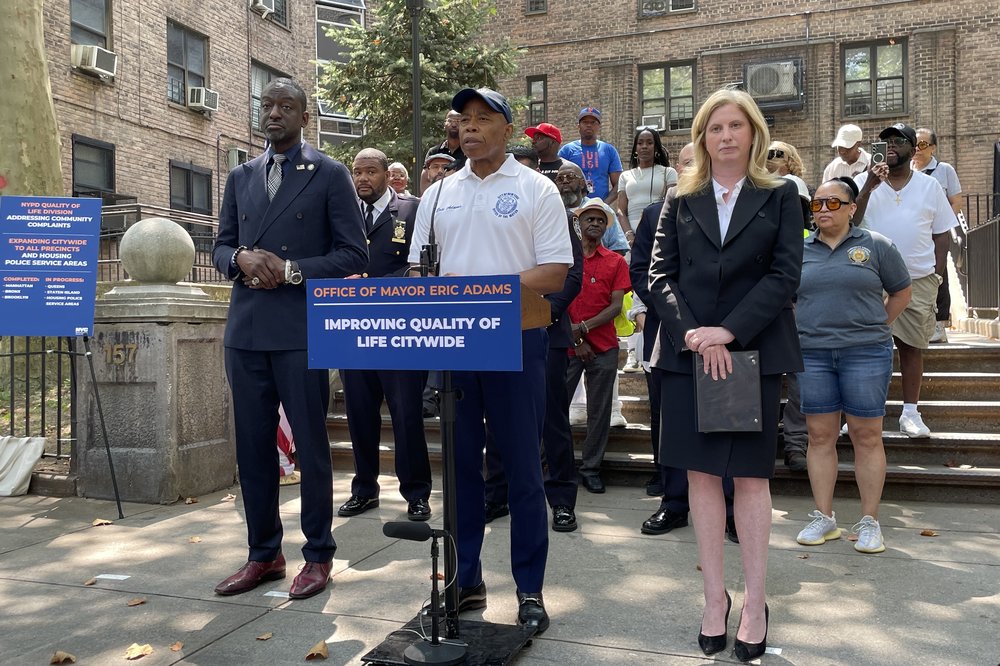'This isn't broken windows,' NY officials say as they expand quality-of-life policing
Aug. 4, 2025, 4:43 p.m.
Mayor Eric Adams said the initiative is meant to help New Yorkers feel safe.

The NYPD’s Quality of Life Division — which focuses on low-level issues like abandoned vehicles, garbage, illegal vending and homelessness — will now be expanding across Brooklyn, following similar rollouts in Manhattan and the Bronx earlier this summer.
While some are criticizing the use of the NYPD to solve an expanding array of issues, Mayor Eric Adams and Police Commissioner Jessica Tisch touted the program’s success at helping address New Yorkers’ perceptions that the city is unsafe.
“It's not just the numbers and the stats, but do you feel safe?” Adams said at the city Housing Authority’s Walt Whitman Houses in Fort Greene on Monday.
He said people felt unsafe because of a variety of quality-of-life issues including “overflowing of trash, substance abuse, people openly using and injecting themselves with drugs on our streets, illegal or abandoned cars.”
Since the pilot program launched in April, the NYPD’s quality-of-life teams responded to more than 23,000 calls to 311 and 911, towed more than 600 abandoned cars, and seized nearly 300 illegal mopeds, scooters and E-bikes, Tisch said.
The police commissioner pushed back against critics who called quality-of-life enforcement a new version of “broken windows,” a policing strategy in the 1990s that focused on low-level crimes and that critics attribute to disproportionate policing in Black and Latino neighborhoods.
“This isn't broken windows. This isn't about cracking down to prevent crime, it's about restoring order and improving quality of life,” she said. “This is also not zero-tolerance. Police officers will always have discretion.”
As Adams and Tisch announced the expansion, NYCHA resident August Sonson watched on and noted that the mayor said nothing about hiring more NYCHA workers to fix and clean things for people living in public housing.
“Bringing police in is just going to agitate them,” Sonson said. “When he brought up the quality-of-life issues, I didn't hear him address the housing issues.”
Nick Encalada-Malinowski, civil rights director for the advocacy group VOCAL-NY, said the Adams administration hasn’t been addressing housing issues but instead using NYPD to solve a wider and wider array of problems much like “ if you're a hammer, everything looks like a nail.”
“The NYPD is resourced in a way that they can always respond to things in a way that other city agencies, which have been defunded by the mayor, cannot,” he said.
“Broken windows” policing became unpopular when metrics were tracked and arrests became the sole purpose, according to Peter Moskos, a criminologist with John Jay College. He said focusing quality-of-life policing to address the perception of public safety can be valuable.
“Of course, that fear can be irrational. And, also the perception of safety can lag behind reality,” he said. “It takes a little while before you realize, ‘Hey, I haven't been yelled at by a crazy man on the subway in a couple weeks. Maybe things really are getting better.’”
Tisch said the expansion of the so-called “Q-Team” into Brooklyn will mean every precinct in Brooklyn will have officers solely dedicated to quality-of-life issues. The department plans to use a database modeled after CompStat, called Q-Stat, to find hot spots and make sure police are deployed in the right locations. Tisch said she hopes to make the database public eventually.
The announcement comes as the city continues to grapple with the fallout of a mass shooting in Midtown Manhattan, where a gunman from Las Vegas killed four people in a Park Avenue office building before turning the gun on himself.
Adams emphasized that the shooter came from a state with more relaxed gun laws, making it harder for law enforcement in New York to prepare or defend against him.
“It's time for the federal government to step up and get these automatic weapons of this magnitude that belonged on a battlefield and not in our cities,” he said.
The NYPD also announced a continued drop in major crimes for the month of July, making it the 10th straight month of such declines. Shooting incidents in particular so far this year are down below the record of 426 by this time of year set in 2017, with 412 incidents recorded from January through Aug. 1, according to the department.
NYPD's quality of life crackdown expands to all Manhattan precincts Monday